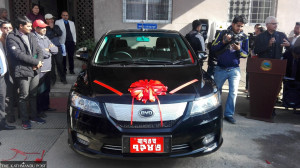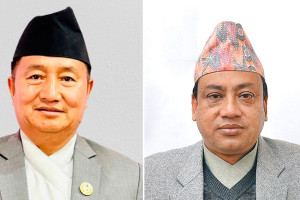Opinion
I have internalised criticism against me in dissolution of CA-I
Over two months in, the Constituent Assembly (CA) seems to be on the right track, or at least in the process
Over two months in, the Constituent Assembly (CA) seems to be on the right track, or at least in the process. The heads of all five CA Committees were elected unanimously and the CA Rules of Procedure and the CA calendar both been drawn up and approved. Compared to the last CA, which amended its calendar over a dozen times, this CA seems to be meeting the deadlines imposed by its calendar. Debate has now begun on contentious issues from the last CA, namely state restructuring. Leading the CA once again as Chairman and Speaker of the House is Subhas Nembang, who was also Chairman of the previous CA. Kamal Dev Bhattarai and Pranaya SJB Rana spoke to Nembang about the CA’s performance, the challenges ahead and the lessons learned from the experience of the previous CA’s dissolution.
How would you assess the performance of the CA so far?
Overall, I am satisfied with the progress. Before February 18, the day when I was elected Speaker, we lost some time. We are still behind on a few issues that the parties and the government need to focus on. For example, the CA should be given its full form. The 26 members of the CA have not been appointed yet, even after a Supreme Court order. Furthermore, questions have been raised about the lack of attendance of top leaders at CA meetings. Many of the government’s ministers, including the prime minister, are also CA members. The perception among some quarters is that ministers think that they do not have to attend the CA. I have made repeated requests to party leaders and the prime minister concerning this. There are signs that this situation is changing. Ministers have started attending the CA and speaking as CA members. On Thursday, for the first time, the prime minister spoke as a member of the CA. Top leaders like Pushpa Kamal Dahal, Jhala NathKhanal, Kamal Thapa and Bijay Gachhadar also spoke at Thursday’s meeting.
One criticism of the previous CA was that a lot of dialogue and negotiation took place outside the Assembly. Is this still the case?
One thing that we can all agree on is the fact that we are still focused on party politics. So whenever we talk of inter-party consensus, it is natural for there to be dialogue between various parties. This can be formal or informal and can take place inside or outside the CA. But the main point is that the CA should be the body for the final dialogue. In the past, the peace process and the CA process were very inter-related. This gave rise to many difficulties. And because we weren’t able to properly understand this, we failed to present a constitution to the people. As long as the issue of former combatants and cantonments remained, the constitution-writing process would not move forward even an inch. There were many who said that the constitution would be written very quickly once the issue of combatants was resolved. But unfortunately, even until Jestha 14 [May 28, 2012], the constitution couldn’t be written and the consensus reached between parties on Jestha 2 [May 15, 2012] was destroyed. Our focus is still on consensus and we believe that it is still possible to write the constitution through consensus. If consensus cannot be reached within the stipulated time, the parties have decided to go for a majority vote. So we are moving forward on the basis of yesterday’s experience.
Concerning the 26 nominations, won’t the decisions taken by an incomplete House raise questions of constitutional legitimacy in the future?
The absence of the 26 members is already sending a negative message to the people. The first meeting of the CA itself should have been a full House. Now, the Supreme Court has spoken. But the government and the parties have not paid full attention to this issue yet. They need to do so immediately as we are soon going to be making critical decisions. We are also in the process of producing a draft, which will have to be taken to the people. A responsible government and responsible parties must think on whether questions will be raised on decisions taken by an incomplete Assembly.
Discussion on the most contentious issue of the last CA—state restructuring—has only just begun discussion in the new CA. Given our recent history, what initiatives have you taken to facilitate dialogue on this issue?
On state restructuring, there is consensus on some issues and contention on others. We are sending the consensual issues to the CA’s drafting committee and taking comments and suggestions from CA members on the contentious issues, which we will send to the dialogue and consensus committee. This is a positive sign, as the consensual and contentious issues will no longer be linked together. Learning from experience, this time around, we have arranged for periodic reports from the Committee to Study and Determine Constitutional Record. Previously, we would only send reports once all issues were resolved. But now, the CA will do its job and the drafting committee and consensus committee will do theirs in parallel. At the same time, we will also be able to hold full CA meetings. Accordingly, I have spoken to Baburam Bhattarai, head of the Political Dialogue and Consensus Committee, and his committee too will work along these lines. They will not wait for consensus on all issues before sending a report. They will discuss, hold dialogue and send periodic reports. The CA will then evaluate the report and send it to the drafting committee. All CA works will proceed in this manner and I am hopeful that the constitution will be drafted according to the calendar.
You spoke of the agreement reached between the parties on Jestha 2 [May 15, 2012]. Since the same parties that reached agreement then are again in the CA, could that agreement be used a draft document to move forward?
That agreement did not last long. Since then, the parties have decided to go farther back than Jestha 2. They have not taken the agreement into account. This is what they presented to the people in their election manifestos. But the political reality remains that the parties reached an agreement. So while it might not be possible to use that agreement as a foundation, it is possible to reflect on the reasons that led to the agreement. That would help leaders reach a decision. So the parties could use that agreement as a reference for dialogue.
On a different note, you had asked CA members to refrain from making trips to foreign countries and even their districts to concentrate on the CA. But despite issuing a ruling, CA members continue to leave the country. What are we to make of this?
I said and requested what I did according to the wishes of the CA members themselves. All the CA members decided on the CA Rules and schedule, both of which state that we will be producing the constitution by Magh 8 [January 22, 2015]. In Kartik [October-November], we will be taking a draft of the constitution to the people. So until then, I asked CA members to refrain from going abroad and wait until the draft is written to go to the districts. I also asked the people to refrain from calling their CA members back to their districts.
Questions regarding your role as Speaker in the dissolution of the last CA have been raised in some quarters. What lessons have you drawn from that experience?
I am always respectful of the comments made about my role as Speaker in the last CA. But I have always said that maybe things didn’t move as have been portrayed. Nevertheless, I have internalised those criticisms as they are quite helpful. I am moving forward accordingly.
What challenges do you see before the CA that could again impede the process?
I don’t see any specific challenge that could halt the CA process. But some problems could arise. The issue of transitional justice came up recently. The Cabinet passed the transitional justice bill but transitional justice commissions have yet to be formed and the process hasn’t moved forward. I request the government and the political parties to begin this process immediately. Furthermore, it is necessary to have consistent dialogue among the political parties. There are a number of constitutional issues that still need to be resolved so they will need constant dialogue. But rather than raise specific issues, I would like to say one encompassing thing. As long as the CA process remains incomplete, the parties must stand together. The constitution, once it is written, will be able to sustain competition and opposition among the parties. But right now, the country is in a transition and is operating under an Interim Constitution; it will not be able to handle disunity between parties.
An important stakeholder in the erstwhile CA, Mohan Baidya’s CPN-Maoist, is currently out of the CA process. Baidya has publicly stated that he will not sit for talks with the Political Dialogue and Consensus Committee. In this situation, how will you take Baidya into confidence and move forward?
The CPN-Maoist has long been saying something that we should all pay attention to—there can be no going back on what has been already been decided through consensus in the last CA. There was some uncertainty concerning this but there is no debate on it anymore. We have decided to begin by taking ownership of the work completed by the last CA. The CPN-Maoist played an important role in that work. For what is remaining, the CA Rules provides for dialogue with forces outside of the CA. The political dialogue committee has this authority.
The committee has decided to conduct both formal and informal talks with these forces by keeping in mind the importance of their role in the entire CA process.




 24.71°C Kathmandu
24.71°C Kathmandu





.jpg&w=200&height=120)





